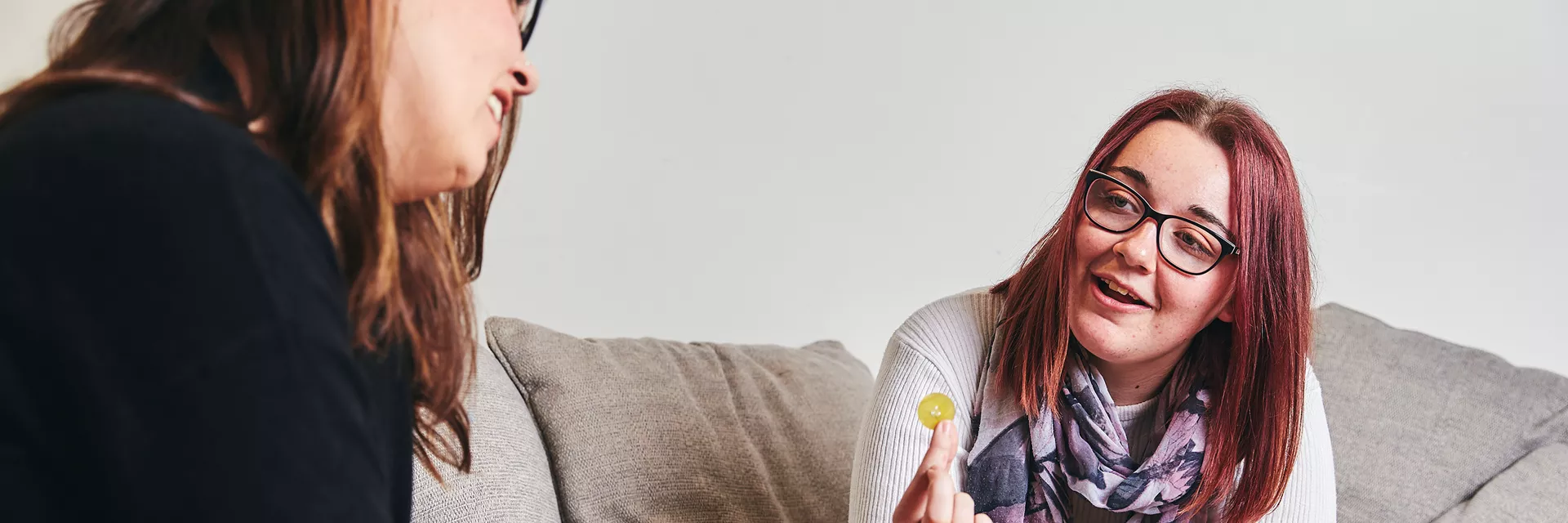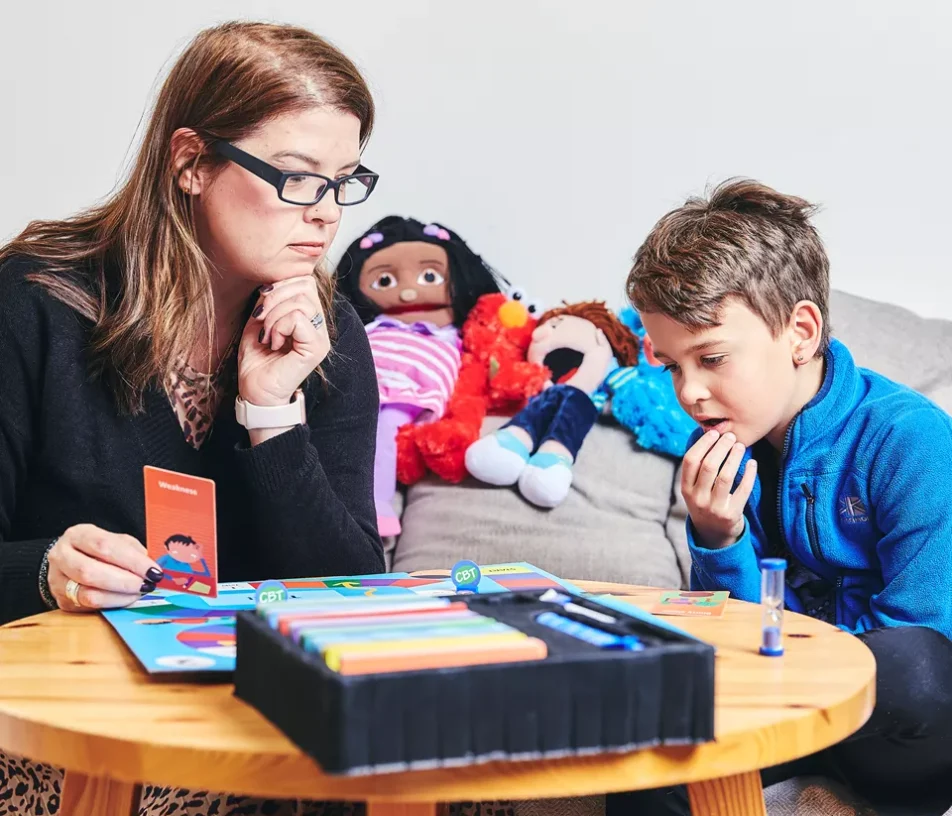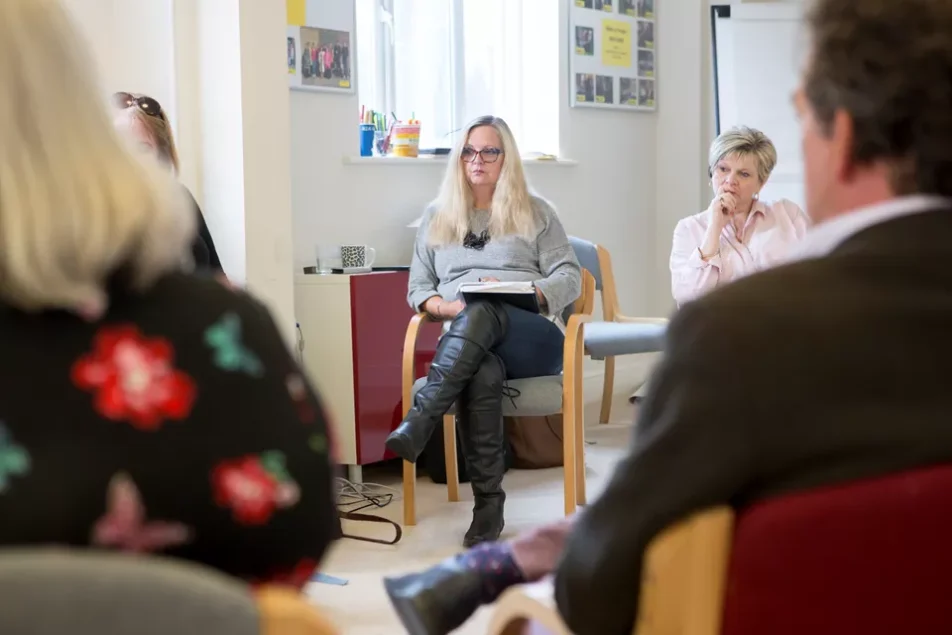
Therapy for foster children
Every young person that’s referred for therapeutic support receives an individual therapy programme that’s tailored to their needs.
Every child’s history is different – often, we don’t understand the full extent of a child’s trauma until later in their care journey.
When a child is referred for therapeutic support, our in-house therapists will complete an initial assessment so they can begin to understand how the child’s history has impacted their development and determine their therapeutic needs.
Some children may begin therapy immediately but in many cases, our therapists will work with the supervising social worker and foster parents to help the child settle in their new home first. We find that young people are able to engage more positively with therapy once they have established a meaningful relationship with their foster parents.

Therapy services
Our tailored therapy programmes help young people reflect on their experiences and discover their feelings. It offers them a place where they can share their fears, fantasies, dreams and aspirations, whilst experiencing a trusting and safe long-term relationship with an adult.
Discover some of the therapy services that are available to the children and young people in our care and delivered by our in-house therapists.
Child and adolescent psychotherapy
Psychotherapy is concerned with how our early life experiences have impacted on our development and functioning in the present. This includes our experiences of being parented, attachment styles and behaviours, situational and/or developmental trauma, and the way in which we process information and respond to difficulties.
Sessions can be individual or family-based, and help our young people and their foster parents to understand current behaviour and coping skills, modify and eventually affect a change in behaviour, mental health and improved functioning. The application of clinical methods is based on established psychological principles and appropriate training.
Educational psychology
We are able to access practitioners who can complete educational psychology assessments for children and young people. These look at how children and young people learn and any barriers to learning.
The assessment offers strategies to support with the delivery of education moving forward and are often completed alongside speech and language assessments to ensure that the child or young person has the language skills necessary to be able to understand what is being asked of them.
Speech and language therapy
We support children and young people who have speech, language and communication difficulties. This includes difficulties with:
- Understanding language
- Using language
- Communication and interaction
- Dysfluency (stammering)
- Speech sounds
- Social skills
Art and play therapy
All our centres have well-equipped therapy rooms from which our therapists deliver art and play therapy to children and young people. Using play and creative arts, children are free to express their inner thoughts, feelings and deepest emotions in a safe space.
Play, as a technique to safely and gently gain access to unconscious processes, allows children to share with us their early experiences of their world, their anxieties, hopes and dreams through symbolic representation and non-verbal communication.
Cognitive behavioural therapy
Cognitive behavioural therapy (also known as ‘CBT’) focuses on how our thoughts, core beliefs and attitudes affect our actions and behaviour. Using a formulation (such as my thoughts about a situation + my feelings about a situation = how I act/behave in the situation), the practitioner collaborates with the young person to identify the links between their thoughts and feelings, and the corresponding behaviour.
The work incorporates exploring new thinking and feelings about the same situation which inevitably leads to new actions as a result. Thus, healthier coping skills and emotional literacy and resilience are developed for dealing with life’s challenges. CBT is effective in managing heightened levels of anxiety, depression and areas where people are stuck in their thinking.
Anger management
The work delivered by our therapists explores the cause, rather than the symptomatic manifestation of anger. Education around emotional literacy (recognising and understanding what is felt, and managing it) is offered so that children and young people can begin to develop better coping mechanisms for expressing and managing what are usually important and appropriate feelings of anger.
The aim is to help the young person to discharge angry feelings whilst keeping themselves safe.
Therapy for sexually harmful behaviours
We have access to a number of therapists who are trained to provide therapeutic risk assessments with children and young people who present with sexually harmful behaviours and the delivery of therapeutic interventions to support young people who display sexually harmful behaviours.
The risk assessments are a discrete piece of work which gives detailed insight into how the young person came to act out in sexually risky, problematic, and harmful ways. The assessments offer a historical context to the behaviours and identify how and when a young person became sexualised at a developmentally inappropriate age and stage. Gaps in knowledge and understanding of sex and sexual behaviour are addressed through bespoke pyscho-sexual education for the young person in light of their prior experiences.
Following the assessment, a young person can make meaning of their experiences to date, understand sexual abuse, body safety and most importantly, how to form healthy relationships which include consent, respect, mutuality and trust. Should further therapeutic intervention be indicated, the recommendation will identify the most appropriate form of therapy for the young person going forward.
Life story therapy
Within our therapy service, we are able to offer therapeutic life story work as an additional service for a fee. The work involves the therapist collating an extensive chronology of the child’s journey into care and adding relevance to any provided life story work.
Following all parties agreeing on the chronology and it being put into a friendly format, they will then support the child or young person through a combination of therapeutic approaches (dependent on the child or young person’s needs and age) to make sense of the journey and life events.
Speak to our team today
Whether you’re looking for more information or you’re ready to apply, we’re here to help you on your journey.
Enquiry Form
The company takes the requirements of GDPR seriously in ensuring the privacy and lawful processing of personal data provided to us by you. Please view our privacy notice which explains how the company will manage and use your personal data. This site is protected by reCAPTCHA and the Google Privacy Policy and Terms of Service apply.


